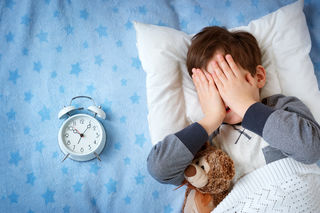
Sleep is the cornerstone of wellness in all ages, especially for growing children. When it’s bedtime for a child with hyperactivity disorder (ADHD), difficulties with sleep affect the parents as well as the child. In fact, studies have shown that up to seven of every 10 children with ADHD have clinical sleep disturbances.1
A false sense of security

Source: shutterstock_512565058
Among many parents, a sense of relief and calmness washes over them when a child with ADHD goes to bed. Sleep-related issues may include resistance to going to bed, difficulty falling asleep, staying asleep, or waking too early.
Parents might initially react with dread, “Please, just let me have my peace at night!” or skepticism, “Night should be the time when my child is calm.” When sleep disorders and irregular sleep go undetected, there is typically a negative impact on daytime functioning that can worsen ADHD symptoms.
At the crossroads between poor sleep and ADHD
Children with poor sleep may exhibit hyperactivity, impulsivity, or irritability while adults are more likely to experience sleepiness, fatigue, and decreased energy. A careful sleep and medical evaluation should always be performed before diagnosing ADHD and beginning treatment.
Children with ADHD have higher rates of daytime sleepiness and increased risk of sleep disorders (e.g., sleep disordered breathing, , periodic limb movements during sleep and disorders) than children unaffected by ADHD.2
When a child has already been diagnosed, another complicating factor to consider is that evidence-based treatments for ADHD (e.g., the various stimulant preparations of amphetamine or ), can exacerbate insomnia and sleep disturbances. Additionally, co-occurring disorders (e.g., and ) that are common in children with ADHD may affect sleep, energy, and .
Solving bedtime and sleeping issues
Behavioral sleep treatments work.3 Although a behavioral sleep plan should be guided by a trained clinician, here are some tried and true sleep hygiene tips that can be implemented at home for better sleep quality:
- Create a good sleep environment, which means a cool, dark room with minimal distractions.
- Establish a regular bedtime routine of when to go to bed and wake up (even on weekends).
- Remove distractions from the bedroom such as TVs, computers, phones, and gaming devices.
- Avoid large meals before bedtime.
- Exercise regularly and maintain a healthy .
- Avoid naps during the day.
- Ensure that children are given the opportunity for an adequate amount of sleep. Preschoolers generally need 10-13 hours of sleep per night while school-age children need between 9-11 hours.
Include a medical evaluation
As our understanding of the relationship between ADHD and disrupted sleep has grown, so has our appreciation of the need to successfully diagnose and treat co-occurring sleep disorders earlier to avoid the risk of complications later in life. It’s healthier for the child to get a correct diagnosis.
Several medications commonly used for ADHD can cause insomnia or fragmented sleep as well as other potentially unwanted side effects (e.g., anxiety, irritability, and decreased ). If there is an underlying that is contributing to or causing symptoms of ADHD, it should be identified and treated.
To regain a peaceful bedtime in your household, talk with your pediatrician or a sleep specialist to explore the range of effective treatment options that exist for children with ADHD and co-occurring sleep disorders.
Co-Author Chester Wu, MD, trained in adult psychiatry and sleep medicine, is a staff psychiatrist in Menninger’s Outpatient Services. He is an assistant professor in the Menninger Department of Psychiatry & Behavioral Sciences at Baylor College of Medicine.